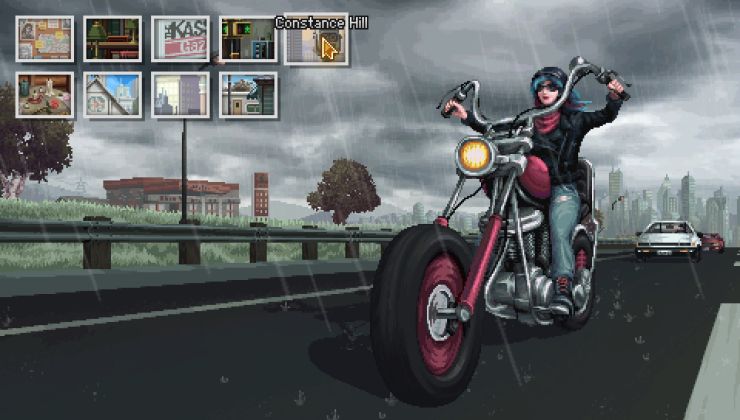The game was released last month, on the 15th August and I’d have written this review sooner were it not for the scene-stealing announcement from Valve regarding Steam Play just a few days after release! But put down those old Windows games for a moment. Honestly, State of Mind is well worth a look.
Disclosure: Copy personally purchased.
The setting is stunning. You’ll transition frequently between a futuristic, dystopian Berlin and a virtual landscape called City 5. It’s all very reminiscent of Deus Ex or Blade Runner and indeed, some of the plot revolves around the idea of what makes us human. In fact, this is a fairly grand game in terms of plot and you’ll recognise a number of tropes throughout: artificial intelligence achieving singularity, the definition of humanity, cyber-augmentation, state surveillance, oppression and rebellion. It’s a testament to the writing, visuals and voice acting that it’s all presented reasonably realistically.

And that voice acting! Nolan is portrayed by Doug Cockle, more famous for his rendition of Geralt of Rivia from the Witcher series. That said, you might recognise Doug as Victor Vran instead, or perhaps as one of the many uncredited voices on Horizon Zero Dawn. Nolan’s mistress, Lydia, is portrayed by another voice acting stalwart, Alexa Kahn, having previously worked on a huge number of TV and Video Games titles, including Horizon Zero Dawn again, The Division, Wasteland 2 and Secret of Mana. Nolan’s wife Tracy is voiced by Laila Pyne notable for her work on, yep, Horizon Zero Dawn and many others, including Xenoblade Chronicles 2, Mirror’s Edge: Catalyst and Star Wars: Battlefront. Finally, Nolan’s android Simon is voiced by Akie Kotabe, who has cropped up on various games such as Need for Speed: Payback, Homefront: The Revolution and (surprise!) Horizon Zero Dawn. I’m beginning to suspect that the “Video Game Voice Acting” industry is pretty compact!
You'll switch between various characters throughout the story, but most of the plot revolves principally around the character of Richard Nolan. Nolan is a journalist working for a large media outlet called The Voice and he is one of the few remaining critics of the use of androids in daily life. The plot is driven by Nolan waking up from a car accident and arriving home to find his wife and young son missing. They were having problems as a family, but Nolan quickly realises that there’s more to it than a marital crisis.
Gameplay
State of Mind is an over-the-shoulder third person adventure. You have free movement around the environment, and there’s a basic but intuitive interface for interacting with objects and people. Branching conversations move the dialogue along while still allowing you stamp some of your own personality on each character’s experience. Some of these are pretty trivial, while others have clear consequences and will affect how later elements of the story play out.

Similarly, some of the interactions are insanely trivial but still completely awesome. For example, you can use a wall panel in your home to activate holographics in your son’s bedroom, alter the lighting, or change the mood sounds to help him sleep. Fancy some fish swimming around the room in low light to the sound of rainfall? It’s all there, and it’s all almost completely irrelevant to the story. There’s a similar piece in City 5, where you use various terminals around a balloon launch to create musical notes, holograms and lighting effects which then triggers in a grand finale when the launch occurs. It’s the many, many touches like this that help establish the environment and make it all feel so real.
There are various puzzle elements along the way, but (with one exception, see below) nothing too strenuous. The most common and sadly the most frustrating is when you have to piece together a virtual scene in order to progress the plot. The scene is built like a Google Photosphere and you’re challenged to fit the scene together like a jigsaw, by cycling through multiple scene options for each segment. It’s a fine concept, but rarely clear which scene you’re trying to build. Nolan’s occasional grunts of “uh huh”, or “that’s better”, or “not quite right” are also delayed just enough to confuse, rather than help. It is, however, still pretty cool when you nail it.

A more satisfying puzzle is based on the fact that you’re a journalist. Snippets of information and photos are presented on a desk, and your job is to find three from the pile which best represent what you need to progress the story. It really draws you into the character when you’re given role-based tasks like this.
Not so good
Object interactions can occasionally be a little frustrating. Sometimes you’ll see the interaction menu pop up and you turn towards it to get it into view and it just vanishes. Then you’ll spend anywhere between 2 and 10 seconds backing up and turning around and pointing towards the object to make the interaction menu appear. It doesn’t happen often, but it’s far from elegant when it does.
One of the puzzles was, to me, just utterly baffling. It has you spinning a train carriage around a circular landing by pressing two unlabelled buttons in two separate locations (you control two characters, seamlessly switching between them in order to coordinate their presses). However, I had literally not a clue what was expected and after three or four minutes of pressing buttons and watching the train spin, I was surprised but relieved when I found that I’d solved it. All the other puzzles in the game are reasonably clear on how you accomplish them, so this train spinning nightmare is a bit of a curve ball.
Personally, I found the pacing to be a little slow. You’ll complete State of Mind in around 10 hours give or take an hour or so, but some of that journey is padded with what feels like unnecessary dialogue, such as when Steve takes you to a coffee shop to rag you out over how you treated his wife (in hindsight, I was pretty harsh with her). On the other hand, Daedalic built an entire coffee shop into the game, and invented 5 minutes of dialogue just on the off chance you were snippy with Steve’s wife. The attention to detail here is pretty admirable!

My only other gripe is minor - when I finish a game, I like to watch the credits rolling. Weird, I know, but I like to know who was behind the game, who contributed and so on. It’s soothing. So when I sat through State of Mind’s credit sequence I was initially pleased to see them also credit the open source projects they used in the game. Great, right? Except, instead of just listing them and maybe thanking their creators and contributors, State of Mind listed the full terms of each licence, in full - SDL, zLib, LibPNG, Ogg Vorbis, OpenEXR, and many, many more. It’s bizarre. As a result, the credits run to around 40 minutes! It’s even more outlandish when you consider that there’s a menu option that you can use to review the terms at any point of your choosing, so listing them in the credits themselves feels pretty redundant.
Summary
So, as with many Daedalic titles, State of Mind is more about the story and less about the gameplay. Provided you bear that in mind, I think you’re in for a treat. Despite the sometimes slow pacing and the sometimes difficult to follow plot, I really enjoyed playing State of Mind. There’s not much room for replay, sadly, unless you’re a completionist, and that pacing really does rob the game of the cinematic presence it truly deserves. But the polish, attention to detail, voice acting and visuals are all of the very highest quality and I would definitely recommend giving this a shot.
RockPaperShotgun is a good source for reviews. Also the metascore pretty much confirms that they are onto something.
Indeed. Aside from GOL, RPS is the only gaming website I actually follow (via RSS feeds). I have never once visited metascore/metacritic/whatever, so I can't comment on that, but I'm glad that review is not an isolated opinion.
Played this about a month ago and I largely agree with the RPS review
RockPaperShotgun is a good source for reviews. Also the metascore pretty much confirms that they are onto something.
I wasn't going to comment on that review, but feel I have to now, if only to provide another perspective (beyond my review itself).
RPS can be extremely arsey (is that a word?) with their reviews. Pretentious - that's a better word. They're trying to be intellectual critics, and often over-analyse. I don't mind that per se, but sometimes it's kind of like a film critic having a go at an action film for not having a political message. They're missing the point - play the game, enjoy it, have fun, first and foremost. They sometimes forget that.
And for me, that review is a massive example of this. Some of the writing... jesus.
I mean, from the review: "Though the whole game is angular, the character models are in a particularly low-res, polygonal style that stands out against the crisp backgrounds. The intention here is to make you consider the uncanny valley that emerges when people become digitalised and the digital becomes humanised."
Frankly, what a load of arse. Also, his plot synopsis suggests that he either hasn't finished the game (their review came out on the day of release, but perhaps they got early access), or he's ignoring key elements of it to shoe-horn in his narrative that the game is trying to do too much with the plot. Apparently State of Mind juggles "six or seven themes of posthumanism" and the reviewer suggests that it should simplify to just one or two?!? What does that even mean??
No, State of Mind isn't a masterpiece, but it's extremely enjoyable. RPS failed to see that apparently, too busy as they were, lamenting instead the lack of "great cyberpunk".
Even more infuriating is the suggestion that humanism in AI isn't addressed - when in fact it's addressed on multiple separate occasions: Richard's relationship with his android Simon, Simon's backstory, City 5's inhabitants, and even (if you chose the same way I did), one of what is surely multiple endings.
So, yeah. Not a fan of that review...
Even less of a fan of Metacritic. Let's just reduce every creative thing ever made to a single number between 0 and 100? Yeah, no thanks!
Last edited by Shmerl on 16 Sep 2018 at 10:52 pm UTC
The game has a few bugs though. Binding the comma key messes up the input configuration. Not nice for those on dvorak keyboards.Dvorak keyboards, huh? So yeah, I guess good keybinding is a major issue.
Haven't heard anything about them for a long time, though. I feel like the technological impetus for them is gone, or at least greatly attenuated. I mean, the point of Dvorak keyboards is that if you need to type an awful lot really fast, they're more efficient. Or rather, I guess they're more efficient period, but it matters if you need to type an awful lot really fast. Now in the old days, there used to be secretaries. They'd take dictation. There would be reams of stuff originally written down with a pen, and you'd have to transcribe it with a typewriter. Lots of stuff where typing really fast was good, lots of jobs where typing already-existing text or trying to type at the speed of speech was a lot of what you did. Dvorak keyboards were a very relevant thing and it was stupid that they didn't catch on more.
But now, nothing is written down in longhand and nobody has secretaries for doing anything except looking like a big shot. You don't transcribe things, you don't take dictation, you don't in general use your fingers to reproduce stuff. You make copies by copying the friggin' file. People use typing almost entirely to compose stuff. If you're thinking really fast and you're using hunt-and-peck your typing can be the limiter on speed, but if you're even a half-assed Qwerty touch-typist you can type as fast as you can compose. So Dvorak isn't really as useful as it once was IMO. Even typing classes seem to have gotten far less common than they used to be, even though more people are using keyboards than ever.
Oddly enough, I see it as the opposite. I grew up with games whose credits could be put on the title screen: “By Matthew Smith”, or “Code by Jon Ritman, Graphics by Bernie Drummond”. I remember when games started to have rolling credits, and it was obvious they were trying to ape movies. It was the more ambitious, narrative-led (I'm trying to avoid saying “pretentious”) gamesBut not trying very hard, eh? ;)
But now, nothing is written down in longhand and nobody has secretaries for doing anything except looking like a big shot. You don't transcribe things, you don't take dictation, you don't in general use your fingers to reproduce stuff. You make copies by copying the friggin' file.Um... dictation, transcription and especially secretaries are all very much still a thing. Some going the way of the dodo, perhaps, but not there yet, and that's just considering industrialized countries. My cousin recently graduated as a stenotypist and was guaranteed a job as soon as she finished her exam. Plenty of doctors here still use dictation and have secretaries transcribe everything for them, as well as digitalize handwritten records. The same holds in many courts of justice.
Even for direct typing, faster tools and techniques have their place for some, but if I wanted more speed than qwerty I'd just go straight to steno if I were gonna learn a new keyboard layout anyway.
(Man, what is it with this article attracting all the off-topic? :P)
Really? Go figure. I stand corrected.But now, nothing is written down in longhand and nobody has secretaries for doing anything except looking like a big shot. You don't transcribe things, you don't take dictation, you don't in general use your fingers to reproduce stuff. You make copies by copying the friggin' file.Um... dictation, transcription and especially secretaries are all very much still a thing. Some going the way of the dodo, perhaps, but not there yet, and that's just considering industrialized countries. My cousin recently graduated as a stenotypist and was guaranteed a job as soon as she finished her exam.
Plenty of doctors here still use dictation and have secretaries transcribe everything for them,Pompous bastards.
Leaves more time for actual consultations. Waiting rooms are crowded enough as it is, and it's easier to find someone who can type than someone who can give sound medical advice.Plenty of doctors here still use dictation and have secretaries transcribe everything for them,Pompous bastards.
RPS can be extremely arsey (is that a word?) with their reviews. Pretentious - that's a better word. They're trying to be intellectual critics, and often over-analyse. I don't mind that per se, but sometimes it's kind of like a film critic having a go at an action film for not having a political message. They're missing the point - play the game, enjoy it, have fun, first and foremost. They sometimes forget that.
In my experience when people say something is pretentious, they actually mean "it's too high-brow for me and that makes me feel insecure so I will attack it".
I mean, from the review: "Though the whole game is angular, the character models are in a particularly low-res, polygonal style that stands out against the crisp backgrounds. The intention here is to make you consider the uncanny valley that emerges when people become digitalised and the digital becomes humanised." Frankly, what a load of arse.
Did you play the game? Because I think that observation fits very well with the game, particularly the last ~30 minutes or so.
Apparently State of Mind juggles "six or seven themes of posthumanism" and the reviewer suggests that it should simplify to just one or two?!? What does that even mean??
The author spells it out at the beginning of the review. Here, let me quote it for you:
The following is an abbreviated list of the events that are happening at the start of the game: the emergence of a Skynet-esque AI; the colonisation of Mars; robots coming to consciousness; a robot uprising; a luddite humanist revolution against tech; an evil tech firm trying to copy and paste consciousness; some kind of Matrix thingy; a plot about memory fragments that is inexplicable; and, you know, another Skynet AI coming to consciousness in China.
There are nine cyberpunk and/or posthumanist tropes mentioned there so I think it's pretty clear what he means.
No, State of Mind isn't a masterpiece, but it's extremely enjoyable. RPS failed to see that apparently, too busy as they were, lamenting instead the lack of "great cyberpunk".
Again, did you read the review? He had a ton of praise for the game and he clearly enjoyed it. Just because he personally found the story lacking doesn't mean he hated it.
It's fascinating how people take reviews that are anything less than 100% praise as personal insults. A review is the personal opinion of the reviewer. Nothing more, nothing less. Don't get defensive because a person felt differently about a game than you did.
RPS can be extremely arsey (is that a word?) with their reviews. Pretentious - that's a better word. They're trying to be intellectual critics, and often over-analyse. I don't mind that per se, but sometimes it's kind of like a film critic having a go at an action film for not having a political message. They're missing the point - play the game, enjoy it, have fun, first and foremost. They sometimes forget that.
Pretentious... Perhaps. But it is a reviewers task to go beyond and behind what shimmers at the surface. They should dig deeper, and show an ability to both analyse and append the necessary nuances to separate this title from all other titles in that same genre(s). And then it's you as a readers luxury to judge if the different parts is as important to you. A good review enables the reader to do exactly that. But those who do care for those nuances should also get their info.
I do appreciate reviewers with a personal writing style, pretentious or not. That's one thing that separates a professional writer from blogs and amateur reviews. But not at the expense of the review itself, of course.
Even less of a fan of Metacritic. Let's just reduce every creative thing ever made to a single number between 0 and 100? Yeah, no thanks!
To be frank I think many misunderstand what a metascore is useful for.
The point with metascores is to give a general indication of what the reception of a title is, the verdict from the mass of professional reviewers that's reviewed the given title. Then one should dive into the individual reviews to discover the reason for their rating.
The ratings itself are no less "reducing" anything more than the grades you receive at school, or pretty much any other verdict on products. To say "this is better than that" is just as "reducing" as giving one a score 8 while the other a score 7. Also, most serious review sites have a rather clear definition of what goes into each score, what makes a title qualify for a give score.
Rating something on a scale is very hard, much harder than giving a general recommendation or warning. And that's exactly why you don't find ratings in user "reviews" (opinions) - the platforms have found out that it's meaningless. Generally speaking user opinions are reduced to give a "thumbs up" or "thumbs down".
Of course, arguing if something is a "73" or "76" is meaningless, and just like in other grades there are situations where individual subjective judgement takes front seat - but that's exactly why one also read the reviews, and not just the scores.
Last edited by Beamboom on 17 Sep 2018 at 8:23 am UTC
I rarely care about reviews of "professional critic" sites. I'm more interested in opinions of fellow gamers.
To be honest I think you then misunderstand the value of a professional review. Why trust random anonymous Joe more than a person who's dedicated his professional life on reviewing that particular type of products? There's no rationality behind that.
Reviewing is a profession, like other professions. It requires experience and insight, and an analytical mind. Not to say there are no bad reviewers, of course there are, but the work of a professional do distance itself from an amateurs work, also on this area.
Last edited by Beamboom on 17 Sep 2018 at 8:44 am UTC
I dunno. You make it sound like there's no such thing as actual pretentiousness, or at least that it's very rare. I don't think that's true. There's an awful lot of people out there, whether in business or academia or the media, trying to dress up little or nonexistent ideas to sound big and significant.RPS can be extremely arsey (is that a word?) with their reviews. Pretentious - that's a better word. They're trying to be intellectual critics, and often over-analyse. I don't mind that per se, but sometimes it's kind of like a film critic having a go at an action film for not having a political message. They're missing the point - play the game, enjoy it, have fun, first and foremost. They sometimes forget that.
In my experience when people say something is pretentious, they actually mean "it's too high-brow for me and that makes me feel insecure so I will attack it".
Last edited by Purple Library Guy on 17 Sep 2018 at 8:12 am UTC
The game has a few bugs though. Binding the comma key messes up the input configuration. Not nice for those on dvorak keyboards.Dvorak keyboards, huh? So yeah, I guess good keybinding is a major issue.
Haven't heard anything about them for a long time, though. I feel like the technological impetus for them is gone, or at least greatly attenuated. I mean, the point of Dvorak keyboards is that if you need to type an awful lot really fast, they're more efficient. Or rather, I guess they're more efficient period, but it matters if you need to type an awful lot really fast.
It matters if you want to learn to type without constantly having your eyes on your keyboard. Which is very useful in itself. And after having typed the "wrong" way for 20 years on a qwerty keyboard, it's nearly impossible to change your way. Switching over keyboards takes away your experience and allows you to start again.
Funny enough, I switched to dvorak at around the same time as I switched to Linux. Both are a superior solution that most people don't want to use because they get stuck in their ways.
I dunno. You make it sound like there's no such thing as actual pretentiousness, or at least that it's very rare. I don't think that's true. There's an awful lot of people out there, whether in business or academia or the media, trying to dress up little or nonexistent ideas to sound big and significant.
While I agree that using big words to cover up for weak arguments exist in the wild, I don't classify that as pretentiousness. Grandstanding might be a better fit. So yes, I do believe pretentiousness pretty much doesn't exist.
I mean, from the review: "Though the whole game is angular, the character models are in a particularly low-res, polygonal style that stands out against the crisp backgrounds. The intention here is to make you consider the uncanny valley that emerges when people become digitalised and the digital becomes humanised." Frankly, what a load of arse.
Did you play the game? Because I think that observation fits very well with the game, particularly the last ~30 minutes or so.
While it's not a meaningless claim, I don't see how anyone could confidently say, "The intention here is to make you consider the uncanny valley that emerges when people become digitalised and the digital becomes humanised." I mean, you can say it had that effect on you, but there's no way of knowing if the creators in fact intended that or if they just liked how it looked, or they had some completely other aesthetic or thematic thing in mind. The chance that that particular sophisticated thematic notion was the intention behind the art style seems actually pretty damn unlikely on average. And whatever the intention, the art is certainly not going to make you consider any such thing--nearly all people playing the game will not, in fact, be considering that.
In that sense the passage is sort of conjuring into existence a large group of cognoscenti who would of course be made to consider the uncanny valley etc. etc. by art like that--a group who, if you are a dummy who doesn't belong to them, you should at least have the decency to tug the forelock to those with the true interpretation, or else pretend you see those awesome clothes the emperor is wearing.
So yeah, kind of a load of arse.
Well, fair enough then.Apparently State of Mind juggles "six or seven themes of posthumanism" and the reviewer suggests that it should simplify to just one or two?!? What does that even mean??
The author spells it out at the beginning of the review. Here, let me quote it for you:
The following is an abbreviated list of the events that are happening at the start of the game: the emergence of a Skynet-esque AI; the colonisation of Mars; robots coming to consciousness; a robot uprising; a luddite humanist revolution against tech; an evil tech firm trying to copy and paste consciousness; some kind of Matrix thingy; a plot about memory fragments that is inexplicable; and, you know, another Skynet AI coming to consciousness in China.
There are nine cyberpunk and/or posthumanist tropes mentioned there so I think it's pretty clear what he means.
Mind you, some of those are dupes--like, two "Skynet AIs" coming to consciousness isn't really two separate themes. And, a robot uprising seems unlikely to happen without robots coming to consciousness, so those aren't really separate themes. For that matter, a robot consciousness is just an AI in a physical body, so all four of those are really just "AIs coming into existence and doing things". The colonization of Mars isn't a theme of posthumanism at all, and I'm not sure Luddites are either. So what we're left with is, stuff about AIs coming into existence and having their own agendas, plus maybe Luddites, copy-pasting consciousness, memory fragments, and "some kind of Matrix thingy", which makes three to five themes of posthumanism depending what "some kind of matrix thingy" means.
But that's "events that are happening at the start of the game". Are all of those events part of the actual plot, or are some of them just setting? It's nice to have a rich background.
But I'd have to agree that whether or not that criticism is actually right (and for that matter, whether or not you agree with a taste for sparseness in themes), it does actually mean something and they did indicate what it was they meant, so I think Scaine's wrong there.
Last edited by Purple Library Guy on 17 Sep 2018 at 8:47 am UTC
Mmm . . . I do think there are advantages to the reviewers' focus and professionalism. But there are systematic disadvantages as well. Reviewers by definition become jaded; their perspective becomes distinct from that of the typical gamer (or moviegoer or whatever) in the sense that they've seen it all before, many times. Thus they start placing more value on things like novelty, or particularly elegant approaches to certain problems or issues that they've seen crop up often before. Their evaluations will be skewed from those of a typical gamer, who may be more interested in questions like "Does it kick ass?" or, in more story-oriented stuff, "Does it tug the heartstrings?"I rarely care about reviews of "professional critic" sites. I'm more interested in opinions of fellow gamers.
To be honest I think you then misunderstand the value of a professional review. Why trust random anonymous Joe more than a person who's dedicated his professional life on reviewing that particular type of products? There's no rationality behind that.
Reviewing is a profession, like other professions. It requires experience and insight, and an analytical mind. Not to say there are no bad reviewers, of course there are, but the work of a professional do distance itself from an amateurs work, also on this area.
So I think it's a serious overstatement to say there's no rationality behind turning to someone whose perspective is closer to one's own, even if their skill is less.
To be honest I think you then misunderstand the value of a professional review. Why trust random anonymous Joe more than a person who's dedicated his professional life on reviewing that particular type of products? There's no rationality behind that.
Because critics are saying it for money, and gamers are saying it how it is. Make your conclusions.
Certain people have this implicit trust in "professional media", I personally don't and I like to evaluate it better. And I don't collect opinions of random gamers either, but of those with whom I already interacted before on various forums and know their preference in games.
Last edited by Shmerl on 17 Sep 2018 at 9:03 am UTC
Well, if you redefine the word to mean something that doesn't exist, then I guess it doesn't exist, but you're going to end up in arguments with people who use the dictionary definition. So what do you think pretentiousness means?I dunno. You make it sound like there's no such thing as actual pretentiousness, or at least that it's very rare. I don't think that's true. There's an awful lot of people out there, whether in business or academia or the media, trying to dress up little or nonexistent ideas to sound big and significant.
While I agree that using big words to cover up for weak arguments exist in the wild, I don't classify that as pretentiousness. Grandstanding might be a better fit. So yes, I do believe pretentiousness pretty much doesn't exist.
Uhhh . . . are you trying to say that it's not possible, or somehow incredibly difficult, to type without your eyes on the keyboard if your keyboard is qwerty? Because that's really not true at all. I got a C- in typing class in grade eight, 40 years ago, and I don't look at the keyboard while I type. Dvorak is by all accounts superior, but let's not make up stuff that isn't real. Dvorak reduces finger travel, it's not magic.The game has a few bugs though. Binding the comma key messes up the input configuration. Not nice for those on dvorak keyboards.Dvorak keyboards, huh? So yeah, I guess good keybinding is a major issue.
Haven't heard anything about them for a long time, though. I feel like the technological impetus for them is gone, or at least greatly attenuated. I mean, the point of Dvorak keyboards is that if you need to type an awful lot really fast, they're more efficient. Or rather, I guess they're more efficient period, but it matters if you need to type an awful lot really fast.
It matters if you want to learn to type without constantly having your eyes on your keyboard. Which is very useful in itself.
Uhhh . . . are you trying to say that it's not possible, or somehow incredibly difficult, to type without your eyes on the keyboard if your keyboard is qwerty?
It's hard to unlearn 20 years of habit.








 How to set, change and reset your SteamOS / Steam Deck desktop sudo password
How to set, change and reset your SteamOS / Steam Deck desktop sudo password How to set up Decky Loader on Steam Deck / SteamOS for easy plugins
How to set up Decky Loader on Steam Deck / SteamOS for easy plugins
I also occasionally dabble a bit in Python, I do Internet Security for a living and finally, I'm a big fan of Neil Degrasse Tyson. And not just because he has a cool first name.
See more from me